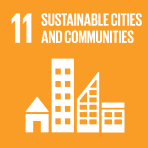 Sustainable Cities and Communities
Sustainable Cities and Communities
Introduction: Listening to an atomic bomb survivor
The Tokyo office of Nihon Hidankyo sits inside an old building with a gable roof and tinted glass windows, a structure that stands out among the sleeker, more modern establishments along the road.
Civil Society and Disarmament 2025
Disarming with Story: How Survivor Stories Shape Nuclear Disarmament Work
Eighty years on, remembering matters more than ever. As the world marks eight decades since the atomic bombings of Hiroshima and Nagasaki, the collective memory of that destruction is fading, even as new nuclear threats emerge. The voices of the Hibakusha (Japanese atomic bomb survivors) as well as other groups affected by nuclear weapons production and testing are a vital bridge to this history. A new UNODA civil society publication by Lovely Umayam explores how survivor stories endure amidst secrecy and forgetting — passed on through direct testimony, digital archives, storytelling, and visual art — so that their message of resilience and call for disarmament reach new generations.
Finding agency and building new identities as survivors: Hibakusha in Japan
Understanding the significance of survivor stories must begin by appreciating their precarity as information.
Conclusion: Telling survivor stories, the best way we know
A month after my conversation with Tanaka-san, I saw him again, but this time on my computer screen. In a video, he was on a stage decorated with wispy strands of Japanese knotweed and orange amaryllis blossoms, arranged around a podium bearing the golden Nobel Peace Prize seal.
Note
The United Nations Office for Disarmament Affairs is publishing this material within the context of General Assembly resolution on the United Nations Disarmament Information Programme (79/69) in order to further an informed debate on topical issues of arms limitation, disarmament and security. This publication series aims to give civil society a platform to express views on disarmament and related matters.
Survivor story, intersubjectivity and bearing witness
Telling stories has helped nuclear weapons survivors forge a collective voice, which they deftly harnessed to gain political representation and advance disarmament policy.
Survivor stories mobilize multilateral disarmament
Nuclear weapons survivor stories carry immense power when shared with Governments responsible for pursuing nuclear disarmament.
Nuclear weapons survivor stories today: select projects
Unlike the fleeting urgency of a news headline or the bland neutrality of a textbook, survivor stories, in their varied forms, have an extraordinary ability to seize our attention.
Regional collaboration for action in Asia and the Pacific
The United Nations Secretary-General’s Call to Action on Extreme Heat urges a shift from reactive measures to a strategic, whole-of-system approach that protects vulnerable populations.
Warming oceans, land, glaciers and atmosphere
Global warming, driven by rising greenhouse gas emissions, is impacting the Earth’s oceans, land, glaciers and atmosphere.
The Asia-Pacific disaster riskscape
Asia and the Pacifi c accounts for more than half of the world’s recorded disasters, with a disaster profile, or ‘riskscape’, that is both complex and continually evolving. Traditionally, the picture was dominated by tropical cyclones and droughts, but patterns are shifting.
Foreword
Extreme heat is a familiar challenge for many people in Asia and the Pacific.
Acknowledgements
The Asia-Pacific Disaster Report (APDR) is a biennial flagship publication of the United Nations Economic and Social Commission for Asia and the Pacific (ESCAP).
Asia Pacific Disaster Report 2025
Rising Heat, Rising Risk: Policy Pathways for Regional Resilience
Asia-Pacific Disaster Report 2025 offers a comprehensive and timely analysis of the growing threat if extreme heat in the Asia-Pacific region. With climate change intensifying the frequency and severity of heat-related hazards, the report presents critical insights into the multi-dimensional impacts of extreme heat on lives, livelihoods, infrastructure, and ecosystems. It provides practical, science-based solutions and regional cooperation strategies to build resilience in one of the world’s most climate-vulnerable regions. Designed for policymakers, disaster risk and climate adaptation professionals, development agencies, researchers, and regional planners, APDR 2025 transforms cutting-edges science into actionable policy recommendations. It makes a significant contribution to the global conversation on climate resilience by calling for integrated, inclusive, and forward-looking responses to extreme heat and increasingly urgent challenge for sustainable development in the Asia-Pacific.
Executive summary
The sun’s rays strike the Earth without regard for national borders. In Asia and the Pacific, rising temperatures are impacting all, everywhere.
Planning for heat resilience
Extreme heat is no longer a seasonal inconvenience. It is a systemic, cross-cutting threat, silently claiming lives, stressing economies, overwhelming cities and widening inequalities.
Extreme heat – disrupting lives, economies and ecosystems
As indicated in chapter 1, rising temperatures and heatwaves are a hazard with distinct geographic and climatic characteristics.
